
Nadia Al-Lami (left) and Victoria Keeton (right) with Head Start families after a nutrition class (photos by Elisabeth Fall)
Community Partnerships Strive for Health Equity Across the Life Span
In October 2017, UC San Francisco launched a groundbreaking campaign to raise $5 billion aimed at solving the world’s most pressing biomedical problems. “Partnering to Achieve Health Equity” is one of the campaign’s three grand challenges. It is a challenge the UCSF School of Nursing has been at the forefront of tackling for decades.
The School’s current partnerships directly confront health inequities across the life span by, among other things:
- Addressing disparities in reproductive health in African American communities
- Improving nutrition and nutrition education for preschoolers and their families living in urban food deserts (places where fresh fruit and vegetables are not readily available or are prohibitively expensive)
- Offering mental health services for marginalized teens and homeless adults
- Expanding capacity to deliver primary care to the mentally ill and those with developmental disabilities
- Raising awareness of and providing access to mental health services for Alzheimer’s caregivers in poor Asian American and Pacific Islander communities
- Helping diverse communities understand and prevent cognitive decline
What follows is merely a peek at a few of the School’s programs already making a difference.
Preventing Inequities Before Birth
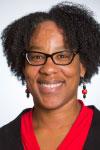 Monica McLemore Researcher and nurse Monica McLemore is a seemingly tireless advocate for addressing inequities in women’s reproductive health. In addition to serving as an assistant professor at the School and holding appointments at the UCSF Bixby Center for Global Reproductive Health and UCSF’s Preterm Birth Initiative (PTBi) California, McLemore has provided expert testimony before Congress and to the media.
Monica McLemore Researcher and nurse Monica McLemore is a seemingly tireless advocate for addressing inequities in women’s reproductive health. In addition to serving as an assistant professor at the School and holding appointments at the UCSF Bixby Center for Global Reproductive Health and UCSF’s Preterm Birth Initiative (PTBi) California, McLemore has provided expert testimony before Congress and to the media.
Deeply committed to partnering with individuals and communities to effect change, McLemore has long provided educational and research support to the East Bay Community Birth Support Project, a collaboration among UCSF, the Birth Justice Project and the Black Women Birthing Justice collective. The project trains low-income and previously incarcerated women to become birth doulas – companions who offer nonclinical support to women in childbirth. There is some emerging evidence that this type of culturally responsive care can improve infant and maternal morbidity and mortality.
As an offshoot of this work, McLemore recently testified at a Congressional Black Caucus hearing while wielding a report authored by Black Women Birthing Justice. The report – Battling over Birth: Black Women and the Maternal Health Care Crisis in California – is co-authored by UCSF midwifery student Talita Oseguera and tells more than 100 birth stories from across California, with some of the chapters provided by the doulas. “[Congress] intends to use the report as an evidence base to introduce proactive legislation,” says McLemore.
Her work at PTBi California provides a powerful complement to the doula partnership. McLemore and PTBi California’s co-principal investigator, Linda Franck, have shown they can effectively engage black women affected by reproductive health inequities – not just as research subjects, but in the formulation of research questions that, ultimately, will drive interventions to reduce preterm birth. Franck and McLemore recently published an article and a video in the Journal of Visualized Experiments that describe how they have engaged these women.
Healthy Lives Demand Healthy Diets
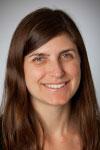 Victoria Keeton A couple of years ago, pediatric nurse practitioner and Associate Clinical Professor Victoria Keeton became concerned that the toddlers and preschoolers in her pediatric primary care practice at Priscilla Chan and Mark Zuckerberg San Francisco General Hospital and Trauma Center (ZSFG)’s Children’s Health Center seemed increasingly overweight. She ran the numbers and found that in this predominantly low-income, Latino population, body mass index (BMI) was higher than the national average. This was deeply disturbing to Keeton, who also coordinates the Healthy Lifestyles childhood obesity clinic at ZSFG.
Victoria Keeton A couple of years ago, pediatric nurse practitioner and Associate Clinical Professor Victoria Keeton became concerned that the toddlers and preschoolers in her pediatric primary care practice at Priscilla Chan and Mark Zuckerberg San Francisco General Hospital and Trauma Center (ZSFG)’s Children’s Health Center seemed increasingly overweight. She ran the numbers and found that in this predominantly low-income, Latino population, body mass index (BMI) was higher than the national average. This was deeply disturbing to Keeton, who also coordinates the Healthy Lifestyles childhood obesity clinic at ZSFG.
Around the same time, the health and nutrition manager for children’s services at Mission Neighborhood Centers, Inc. (MNC) had become concerned about obesity levels in the young people at the organization’s Head Start centers in San Francisco’s Mission and Bayview-Hunters Point neighborhoods. Many of the attending families are also patients at ZSFG’s Children’s Health Center, and this connection eventually led to Keeton volunteering to bring a version of ZSFG’s Healthy Lifestyles program directly to the Head Start centers. Delivered in both English and Spanish, what MNC calls Healthy Start is part class, part support group; the four hour-long sessions help young families engage in healthy eating and physical activity despite limited access and resources.
“It’s been a great success,” says Kristine Ramilo, the current health and nutrition manager for children’s services at MNC. “We have had very positive feedback from parents, and along with physical activity throughout the day and promoting healthy eating in the classroom, we believe the program has been a factor in our ongoing work to reduce the number of obese children each program year and overall in our community.”
“It’s a great model,” says Keeton. “And it has also been an opportunity for [UCSF nursing] student placements.”
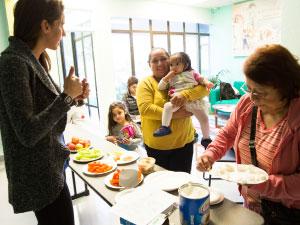 Nadia Al-Lami works with Head Start clients during a lesson that raises awareness of the often hidden fat content in many fast foods. Nadia Al-Lami was one of those students. A college soccer player, youth coach and then a coordinator in pediatric nutrition and weight control programs in Philadelphia and at Stanford University, Al-Lami has an enduring passion for addressing childhood obesity. She recognized that even as Healthy Start provided tools and education, families still had to go back to their communities; for many, fresh fruit and vegetables are not readily available or can be prohibitively expensive. So with Keeton as her mentor and with the support of a scholarship from the Bernard Osher Foundation, Al-Lami began exploring ways to make fresh produce more available to the Head Start families.
Nadia Al-Lami works with Head Start clients during a lesson that raises awareness of the often hidden fat content in many fast foods. Nadia Al-Lami was one of those students. A college soccer player, youth coach and then a coordinator in pediatric nutrition and weight control programs in Philadelphia and at Stanford University, Al-Lami has an enduring passion for addressing childhood obesity. She recognized that even as Healthy Start provided tools and education, families still had to go back to their communities; for many, fresh fruit and vegetables are not readily available or can be prohibitively expensive. So with Keeton as her mentor and with the support of a scholarship from the Bernard Osher Foundation, Al-Lami began exploring ways to make fresh produce more available to the Head Start families.
Finding a food distribution partner that is qualified to accept food stamps and could deliver the groceries in an accessible way to families has not been easy. But Al-Lami is in the process of forging a partnership with Imperfect Produce, a food distribution company based in San Francisco. In the interim, a representative from Head Start picks up surplus produce from Imperfect’s warehouse and distributes it during the Healthy Start classes.
“Having access to affordable produce when families pick up their children reduces so many additional steps they would need to get healthy food in the home, especially in areas with limited access to produce,” says Al-Lami.
“It is a real advantage to have practitioners with Victoria’s and Nadia’s expertise doing this work,” says Ramilo. “Health and nutrition are such important components for school readiness, and their efforts are a step in the right direction to our children leading happy and healthy lives.”
Attending to the Mental Health Needs of Marginalized Youth
In San Francisco, it is not uncommon to find teens and young adults wandering the streets, many of them runaways, many of them confronting struggles with substance use, risky sexual behavior, food insecurity, housing instability, joblessness and the type of despair that typically accompanies life on the streets. Since 1984, Larkin Street Youth Services has given these youth a place to call home in the city.
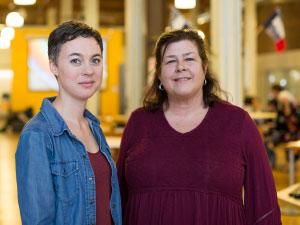 Carol Dawson-Rose (right) with Eva Kersey, manager of Health Interventions and HIV Prevention at Larkin Street Youth Services Serving these young people, however, is an evolving challenge, so the organization is always on the lookout for ways to expand and improve its offerings. In 2017, they turned to the School and Carol Dawson-Rose for help. Dawson-Rose and Larkin Street then secured a five-year grant from the Substance Abuse and Mental Health Services Administration to undertake a needs assessment and help implement suggested changes that would emerge from the assessment.
Carol Dawson-Rose (right) with Eva Kersey, manager of Health Interventions and HIV Prevention at Larkin Street Youth Services Serving these young people, however, is an evolving challenge, so the organization is always on the lookout for ways to expand and improve its offerings. In 2017, they turned to the School and Carol Dawson-Rose for help. Dawson-Rose and Larkin Street then secured a five-year grant from the Substance Abuse and Mental Health Services Administration to undertake a needs assessment and help implement suggested changes that would emerge from the assessment.
“I’m now working with leadership on how to build capacity and training frontline staff on motivational interviewing to help them help their clients,” says Dawson-Rose.
“Nearly everything we’re working on [with the School] is bringing new value,” says Eva Kersey, Larkin Street’s manager of Health Interventions and HIV Prevention. “The grant allowed us to restart HIV [human immunodeficiency virus] testing, and we will add rapid hepatitis C testing in the near future. The focused training on motivational interviewing helps our direct service staff get more comfortable with the technique, while also giving us a curriculum that we can use with new staff in the future.”
In addition, Psychiatric/Mental Health Nurse Practitioner (PMHNP) students are now running weekly groups on trauma and substance use with Larkin Street clients. The groups are a standardized seven-week program of group therapy, called Seeking Safety, for people with post-traumatic stress disorder (PTSD) and co-occurring substance use.
“We were very impressed by how these young people engaged with the material,” says Marlene Thompson, one of the two NP students who led groups at Larkin Street in the first year of the grant. “It was very humbling to go on that journey with them – and really satisfying to offer something that could tangibly help their lives.”
“We left each group feeling very positive about the conversations we had,” says Michelle Hanna, the other group leader. “We all learned something we could take home.”
For their part, Larkin Street hopes the groups continue even after the grant is completed, perhaps through clinical placements for PMHNP students. “The students have done a really good job, and one of the benefits is that the providers of tomorrow are learning about the issues of marginalized, transitional-age youth, who in turn will be better served in the community,” says Julie Frank, Larkin Street’s director of Behavioral Health.
In short, Frank continues, “This partnership builds on the strengths of both organizations – a collaboration of the right partners.”
Meeting the Mental Health Needs of Homeless and Immigrant Adults
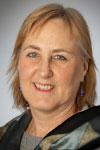 Bethany Phoenix Homeless adults and recent immigrants are also populations that struggle to access a variety of health services, especially much-needed mental health care. In an effort to address that concern, the School’s Bethany Phoenix secured a Health Resources & Services Administration grant to add behavioral health services to a primary care clinic associated with St. Anthony Foundation, a social service organization in San Francisco’s Tenderloin neighborhood.
Bethany Phoenix Homeless adults and recent immigrants are also populations that struggle to access a variety of health services, especially much-needed mental health care. In an effort to address that concern, the School’s Bethany Phoenix secured a Health Resources & Services Administration grant to add behavioral health services to a primary care clinic associated with St. Anthony Foundation, a social service organization in San Francisco’s Tenderloin neighborhood.
“A lot of these people have been exposed to traumatic events, including political violence and assaults,” says Phoenix. “Many are suffering from severe mental illness, but it’s difficult for them to get timely mental health services, especially with the demand so high.”
The grant enables St. Anthony clients to receive behavioral health services in the primary care clinic from two PMHNP faculty members – Kara Birch and Katelyn Brady – who will attend in the clinic three days a week. Part of the grant also involves exploring ways to better integrate behavioral health into primary care. How best to screen for mental health concerns? When should primary care providers do a warm handoff to a behavioral health provider for further assessment or a brief intervention? How can the behavioral health providers help primary care providers implement evidence-based disease management strategies for common mental health needs, such as depression and anxiety? The grant will also examine ways to make the behavioral health integration financially sustainable once the grant funding expires. Reimbursement for such services remains a challenge, says Phoenix.
She adds, “The foundation also operates a men’s substance use treatment program, and we will be doing initial evaluations for people going into that program.” Once the PMHNP faculty are integrated into the clinic’s workflow, PMHNP students will also participate in the behavioral health integration project.
Getting Primary Care to the Mentally Ill and Developmentally Disabled
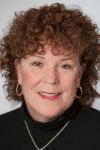 Gerri Collins-Bride For more than two decades, a School faculty practice led by Gerri Collins-Bride – Interprofessional Primary Care Outreach for Persons with Mental Illness (IPCOM) – has embedded a primary care service in residential mental health treatment programs located in San Francisco and Napa. Established in 1995 as a partnership with Progress Foundation, IPCOM is nationally recognized as an innovative model for delivering general health care services at the site of psychiatric treatment – a kind of mirror version of traditional behavioral health integrations.
Gerri Collins-Bride For more than two decades, a School faculty practice led by Gerri Collins-Bride – Interprofessional Primary Care Outreach for Persons with Mental Illness (IPCOM) – has embedded a primary care service in residential mental health treatment programs located in San Francisco and Napa. Established in 1995 as a partnership with Progress Foundation, IPCOM is nationally recognized as an innovative model for delivering general health care services at the site of psychiatric treatment – a kind of mirror version of traditional behavioral health integrations.
“There are real disparities in terms of people with mental illness getting primary care,” says Collins-Bride. That’s why in IPCOM, the providers not only deliver primary care services, but also work to find ongoing sources of primary care once clients move on from the Progress Foundation sites. “One of our biggest accomplishments is having demystified health care for so many people.”
At the same time, the partnership has been an invaluable training ground for many students. A number of the School’s current faculty trained in these settings, and you can find former students who trained at Progress practicing at mental health settings throughout the city.
In addition to her work with IPCOM, Collins-Bride is also director for clinical education and training in the Clinical, Advocacy, Research and Training (CART) Services program in the UCSF Office of Developmental Primary Care. Funded by five of the regional centers in Northern California that provide services for individuals with developmental disabilities, CART delivers training and intensive consultations for providers, often in rural areas. “We help them learn more about how to take care of people with developmental disabilities and share ideas about what might be happening [with individual clients],” says Collins-Bride, who works closely with CART director and UCSF physician Clarissa Kripke.
In providing these services, the project helps build capacity to treat a patient population often poorly served in the primary care setting. “People with disabilities are not always treated as having the same value as others in the health care system – or they are poorly understood, which can make them vulnerable to real quality-of-care issues,” says Collins-Bride.
Helping Dementia Caregivers Access Mental Health Services
 Van Ta Park “Most of my work is focused on disparities in mental health and related areas – and mostly with Asian Americans and Pacific Islanders,” says Van Ta Park, one of the newest members of the School’s faculty.
Van Ta Park “Most of my work is focused on disparities in mental health and related areas – and mostly with Asian Americans and Pacific Islanders,” says Van Ta Park, one of the newest members of the School’s faculty.
A project, funded by the Alzheimer’s Association, tests whether a culturally tailored, evidence-based program can reduce stress and depression among dementia caregivers in the Bay Area’s Vietnamese American community. Park says this is a group that experiences inequities in mental health services for a number of reasons, including that Asian Americans are often lumped together as part of a model immigrant population. Yet, says Park, Vietnamese and other Southeast Asian immigrants are much more likely to live in poverty than other Asian American cultures. Limited English proficiency and lack of outreach or culturally appropriate services mean some Vietnamese and other Southeast Asian immigrants have less access to insurance. “Those factors often get ignored,” says Park.
In addition, in many Asian American communities, it is considered unacceptable to display depression or sadness, and mental illness carries with it considerable stigmatization, says Park. All of these factors cause this population to significantly underuse mental health care.
In her randomized, controlled clinical trial of 60 Vietnamese dementia caregivers, the control group received usual care from the Alzheimer’s Association – written information about resources for stress and depression. The intervention group attended four weekly workshops, rooted in an evidence-based program that teaches caregivers how to recognize and address symptoms of stress and depression. Techniques range from deep breathing and making time for pleasurable pursuits each day to accessing respite care. Participants also learned to accept that their loved one will not get better, as there is no cure yet for Alzheimer’s disease.
“The participants ended up creating their own ongoing support group, and we promised to share our results with them and to brainstorm together about what worked, what didn’t and what’s next; continuing with this work takes years of building these types of relationships,” says Park. “The participants need to know their voices are being heard; that one project is not the end of it.”
Park is also using a novel technique to raise awareness in the Asian American and Pacific Islander community about the concept of precision mental health. “We wanted to help this community expand its knowledge and its willingness to engage in research about mental health, and I hit upon this idea of using Korean drama, which is an incredibly popular phenomenon that crosses cultures and language groups,” says Park. As of 2014, “K-dramas” received millions of views per month on Hulu, and were available with subtitles in multiple languages.
After using K-dramas to get people to agree to participate, the research team assessed participants’ baseline knowledge, attitudes and behaviors about topics that included genetic testing, mental health, help-seeking and willingness to participate in research. Then participants watched selected scenes on those topics and debriefed afterward with a trained facilitator.
“The participants said the dramas were very inviting as opposed to [dry] health education,” says Park. “And they learned a lot because they were able to engage in types of conversations they don’t normally engage in. This was my third study using K-drama, and I’m very excited about the possibilities.”
Providing the Research Base
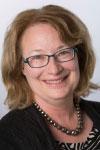 Julene Johnson In some ways, Park’s work is a natural corollary to that of Interim Associate Dean for Research Julene Johnson, who is working on a paper about the results of her Community of Voices project, a recently completed National Institutes of Health (NIH)-funded randomized controlled study of 12 community choirs based at senior centers in culturally diverse San Francisco neighborhoods. While she cannot yet speak specifically about her findings, Johnson says there is widespread enthusiasm for the concept of community choirs. “My hope is that a national group like the AARP might take it up and expand it nationally,” she says.
Julene Johnson In some ways, Park’s work is a natural corollary to that of Interim Associate Dean for Research Julene Johnson, who is working on a paper about the results of her Community of Voices project, a recently completed National Institutes of Health (NIH)-funded randomized controlled study of 12 community choirs based at senior centers in culturally diverse San Francisco neighborhoods. While she cannot yet speak specifically about her findings, Johnson says there is widespread enthusiasm for the concept of community choirs. “My hope is that a national group like the AARP might take it up and expand it nationally,” she says.
Johnson is also associate director at the Institute for Health & Aging, where she mentors junior researchers who are also intent on addressing health inequities. Elena Portacolone is one of Johnson’s mentees. Portacolone studies the effect on older adults of living alone, and is building strong relationships in the Bayview-Hunters Point neighborhood, aimed at designing more effective recruitment strategies for engaging the African American community in research on cognitive impairment. A 2014 article in Health Affairs noted that a growing body of evidence indicates older African Americans are two or three times more likely to develop cognitive impairment than non-Hispanic whites.
Similarly, the School’s Department of Social and Behavioral Sciences is a key research source for addressing health inequities. Faculty members from this historic department were pioneers of community-based research; for more than half a century, the department has been one of the nation’s go-to academic settings for research on the social determinants of health.
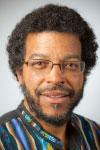 Howard Pinderhughes “What I’m really excited about today is that we sit as the disciplinary nexus for the university’s whole health equity focus,” says sociologist Howard Pinderhughes, the department chair. “There is tremendous potential for us to play a more central role in the evolution of this priority area for the university – to provide the balance for the biomedical focus.”
Howard Pinderhughes “What I’m really excited about today is that we sit as the disciplinary nexus for the university’s whole health equity focus,” says sociologist Howard Pinderhughes, the department chair. “There is tremendous potential for us to play a more central role in the evolution of this priority area for the university – to provide the balance for the biomedical focus.”
Pinderhughes himself is in the middle of discussions with the university’s leadership aimed at formulating dramatic new ways to address health inequities in the Bay Area. “We are starting to make some noise about truly moving the needle on the social determinants of health – and I’m excited that the School of Nursing will be right in the middle of this.”



